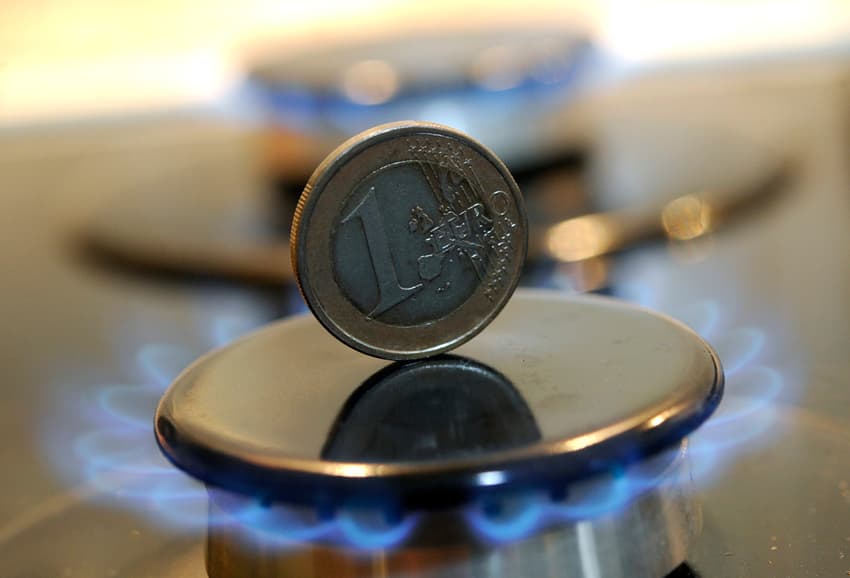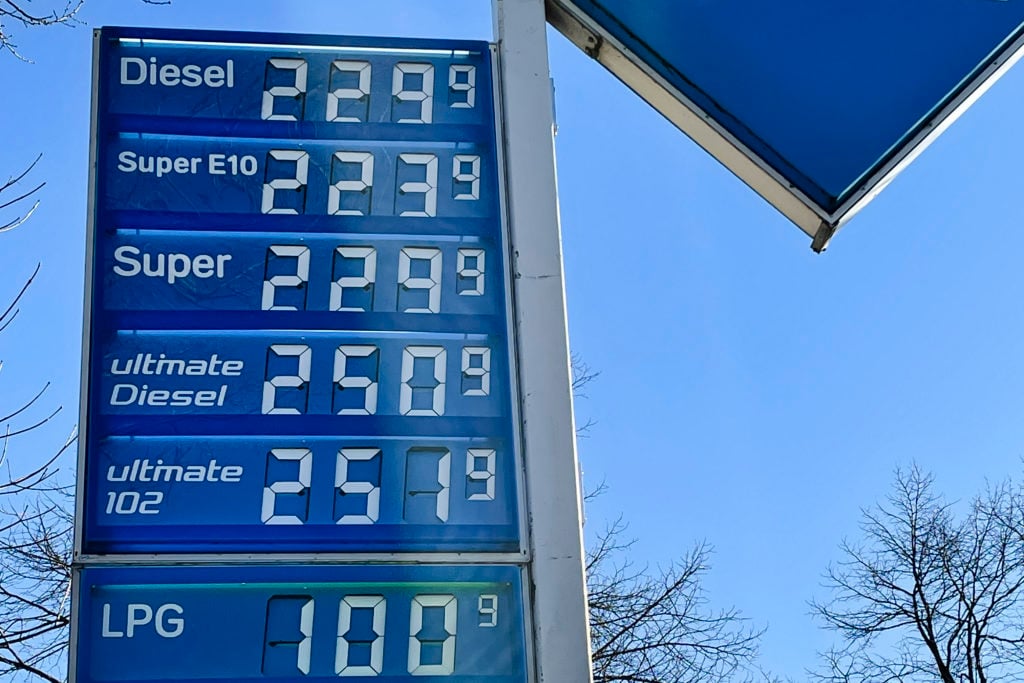Why consumers in Germany are seeing their energy costs go down

Prices for gas, electricity and fuel are falling in Germany. But not everyone is reaping all the benefits just yet.
Following Russia’s invasion of Ukraine last year, a squeeze on cheap energy supplies to Germany led to gas, fuel, and electricity prices reaching record levels in 2022.
But in the first few months of 2023, energy prices have been falling and March was the first month since the start of the war in which fuel prices were below the values from the same period last year.
According to the German Automobile Association (ADAC), in March this year, the nationwide average values for a litre of E10 petrol were €1.76 and just under €1.72 for diesel. That’s a decrease of 30 cents for E10 petrol and 42 cents for diesel since March 2022.
Though this sharp year-on-year drop has a lot to do with the fact that March 2022 was the most expensive month for fuel since records began, fuel prices have been normalising since the beginning of the year. ADAC fuel market expert Jürgen Albrecht commented that "the expected normalisation is progressing".
READ ALSO: Inflation in Germany eases due to lower energy prices
However, the old, cheaper price point of diesel compared to petrol has still not been fully restored. On a long-term average, diesel was around 15 cents cheaper than E10 before the outbreak of the Ukraine war. As of last Thursday, the price of diesel was only 9.1 cents cheaper per litre than petrol.

A petrol station in Kiel, Schleswig-Holstein, displays the prices for petrol and diesel on March 14th, 2022. Photo: picture alliance/dpa | Frank Molter
But energy prices are not only falling at the petrol station - household energy prices are also becoming cheaper.
According to a report by the comparison portal Verivox, energy costs for private households fell in the first quarter of 2023 for the first time in two years. According to the report, electricity and fuel fell by an average of 18 percent from January to March.
The report shows that energy costs for an average household in the fourth quarter of 2022 were still projected to cost €7,163 per year, whereas, for the first three months of 2023, the same amount of energy was predicted to cost €5,889 per year.
Previously, costs had risen for eight quarters in a row. "In addition to price declines on the commodity markets, government energy price brakes also provided significant relief," the report said.
The coalition government's energy price caps account for some of the price decreases.
The electricity price brake - which caps electricity costs for households and small businesses with a yearly demand of up to 30,000-kilowatt hours at 40 cents per kilowatt hour - has been applied to all electricity customers in Germany since January this year.
The gas price brake - which caps prices at 12 cents per kilowatt hour - started in March 2023 and also retroactively covers the months of January and February.
For the remaining consumption, the normal market price must be paid and market prices have been dropping, too.
A megawatt hour of electricity currently costs around €130 on the spot market. That is much cheaper than in September 2022, when prices were around €500.
The price drop for gas has also been drastic. The average price per megawatt hour is currently around €39, whereas in some cases last year this price rose as high as €350.
Why aren’t all households seeing costs reduced?
So far, however, a lot of consumers are yet to benefit from the lower market prices for gas and electricity, as they are still being supplied with energy that suppliers bought at higher prices last year.
According to Verifox, only very few energy suppliers have so far passed on cost reductions to end consumers with existing contracts.
READ ALSO: Is now a good time to switch energy providers in Germany?
"In the case of electricity tariffs, 82 percent of the basic supply tariffs are above the price cap, and in the case of gas tariffs as much as 92 percent," Verivox CEO Daniel Puschmann told the Augsburger Allgemeine newspaper on Monday. According to the Verifox report, around 25 percent of households in Germany use basic supply tariffs.
However, companies offering new tariffs linked to the current market prices for energy are able to offer lower prices.
Gas tariffs are already available for 10.3 cents per kilowatt hour, which is about 15 per cent cheaper than the energy price cap for gas, while electricity tariffs for new customers are currently available for an average of 32 cents per kilowatt hour from a number of suppliers.
READ ALSO: EXPLAINED: How to change electricity and gas providers in Germany
Puschmann explained that the respective procurement strategies of the suppliers make it difficult for them to pass on falling prices on the market now. "Many basic suppliers buy very long-term and did so when prices were very high. Those contracts with high prices are still on the books now," he said.
Comments
See Also
Following Russia’s invasion of Ukraine last year, a squeeze on cheap energy supplies to Germany led to gas, fuel, and electricity prices reaching record levels in 2022.
But in the first few months of 2023, energy prices have been falling and March was the first month since the start of the war in which fuel prices were below the values from the same period last year.
According to the German Automobile Association (ADAC), in March this year, the nationwide average values for a litre of E10 petrol were €1.76 and just under €1.72 for diesel. That’s a decrease of 30 cents for E10 petrol and 42 cents for diesel since March 2022.
Though this sharp year-on-year drop has a lot to do with the fact that March 2022 was the most expensive month for fuel since records began, fuel prices have been normalising since the beginning of the year. ADAC fuel market expert Jürgen Albrecht commented that "the expected normalisation is progressing".
READ ALSO: Inflation in Germany eases due to lower energy prices
However, the old, cheaper price point of diesel compared to petrol has still not been fully restored. On a long-term average, diesel was around 15 cents cheaper than E10 before the outbreak of the Ukraine war. As of last Thursday, the price of diesel was only 9.1 cents cheaper per litre than petrol.

But energy prices are not only falling at the petrol station - household energy prices are also becoming cheaper.
According to a report by the comparison portal Verivox, energy costs for private households fell in the first quarter of 2023 for the first time in two years. According to the report, electricity and fuel fell by an average of 18 percent from January to March.
The report shows that energy costs for an average household in the fourth quarter of 2022 were still projected to cost €7,163 per year, whereas, for the first three months of 2023, the same amount of energy was predicted to cost €5,889 per year.
Previously, costs had risen for eight quarters in a row. "In addition to price declines on the commodity markets, government energy price brakes also provided significant relief," the report said.
The coalition government's energy price caps account for some of the price decreases.
The electricity price brake - which caps electricity costs for households and small businesses with a yearly demand of up to 30,000-kilowatt hours at 40 cents per kilowatt hour - has been applied to all electricity customers in Germany since January this year.
The gas price brake - which caps prices at 12 cents per kilowatt hour - started in March 2023 and also retroactively covers the months of January and February.
For the remaining consumption, the normal market price must be paid and market prices have been dropping, too.
A megawatt hour of electricity currently costs around €130 on the spot market. That is much cheaper than in September 2022, when prices were around €500.
The price drop for gas has also been drastic. The average price per megawatt hour is currently around €39, whereas in some cases last year this price rose as high as €350.
Why aren’t all households seeing costs reduced?
So far, however, a lot of consumers are yet to benefit from the lower market prices for gas and electricity, as they are still being supplied with energy that suppliers bought at higher prices last year.
According to Verifox, only very few energy suppliers have so far passed on cost reductions to end consumers with existing contracts.
READ ALSO: Is now a good time to switch energy providers in Germany?
"In the case of electricity tariffs, 82 percent of the basic supply tariffs are above the price cap, and in the case of gas tariffs as much as 92 percent," Verivox CEO Daniel Puschmann told the Augsburger Allgemeine newspaper on Monday. According to the Verifox report, around 25 percent of households in Germany use basic supply tariffs.
However, companies offering new tariffs linked to the current market prices for energy are able to offer lower prices.
Gas tariffs are already available for 10.3 cents per kilowatt hour, which is about 15 per cent cheaper than the energy price cap for gas, while electricity tariffs for new customers are currently available for an average of 32 cents per kilowatt hour from a number of suppliers.
READ ALSO: EXPLAINED: How to change electricity and gas providers in Germany
Puschmann explained that the respective procurement strategies of the suppliers make it difficult for them to pass on falling prices on the market now. "Many basic suppliers buy very long-term and did so when prices were very high. Those contracts with high prices are still on the books now," he said.
Join the conversation in our comments section below. Share your own views and experience and if you have a question or suggestion for our journalists then email us at [email protected].
Please keep comments civil, constructive and on topic – and make sure to read our terms of use before getting involved.
Please log in here to leave a comment.